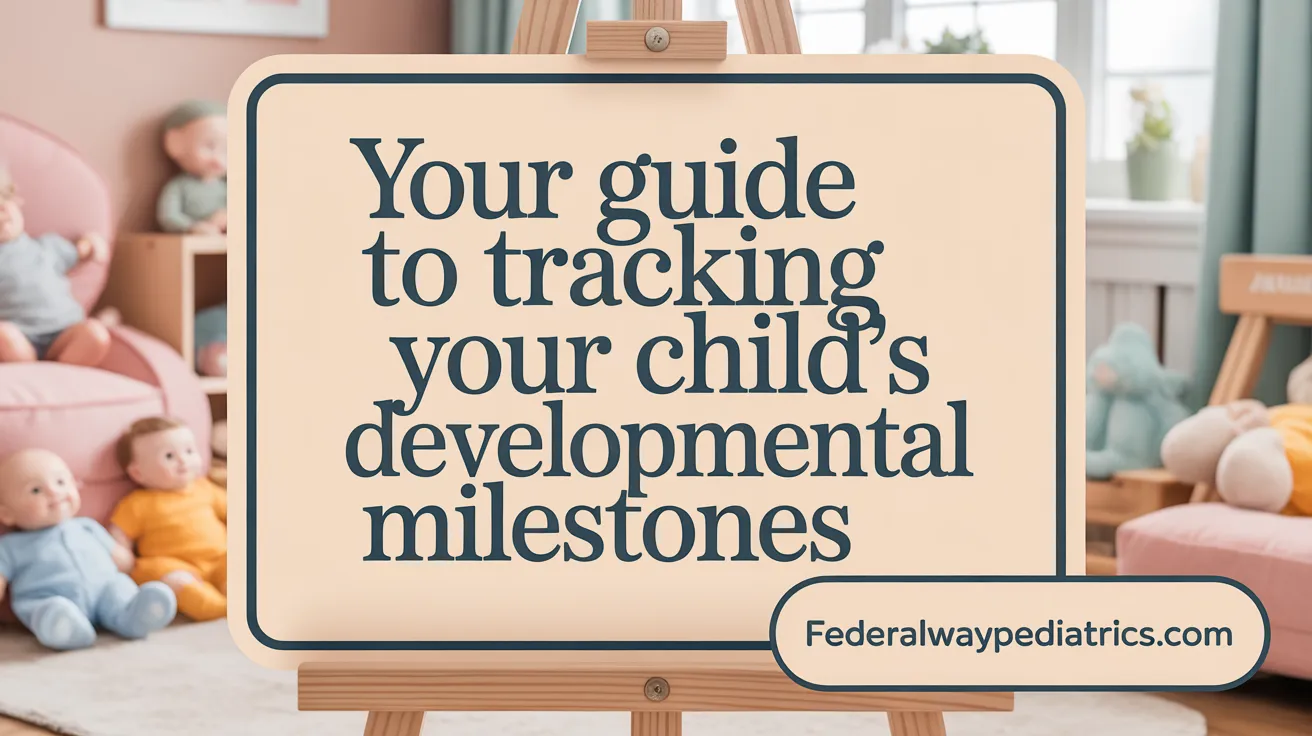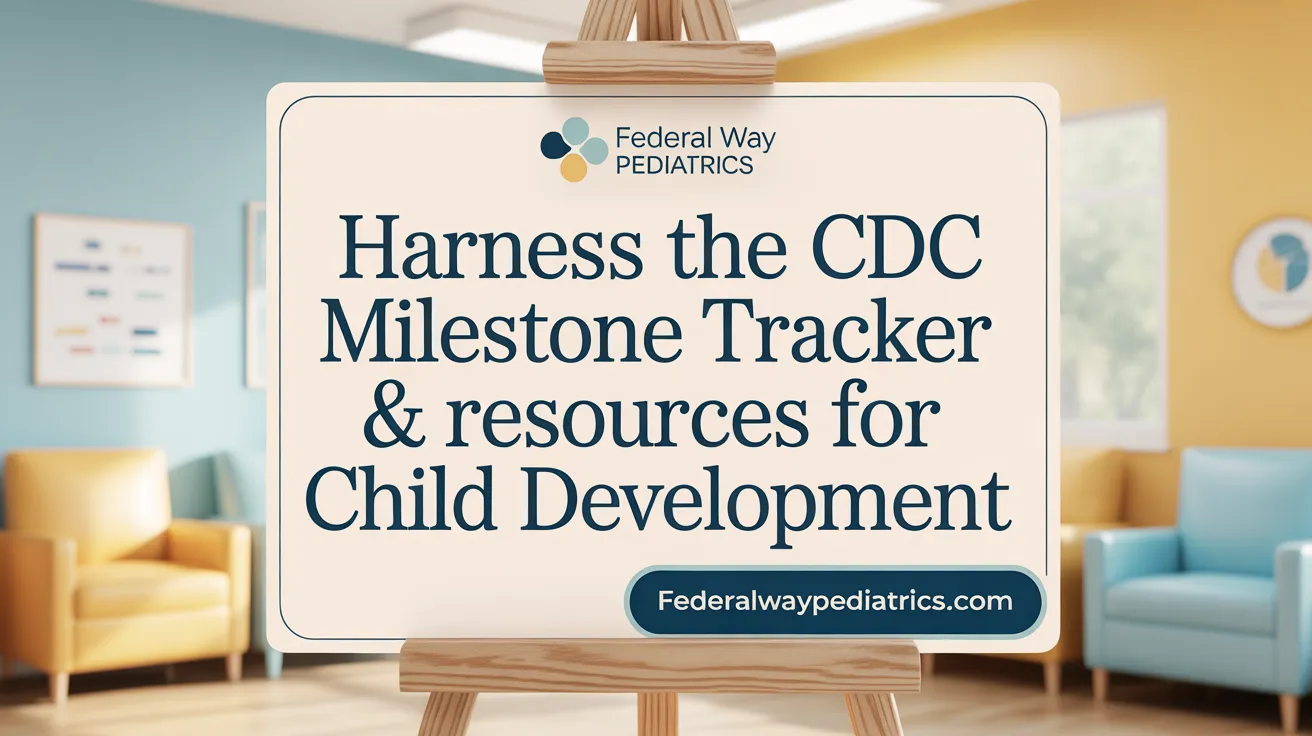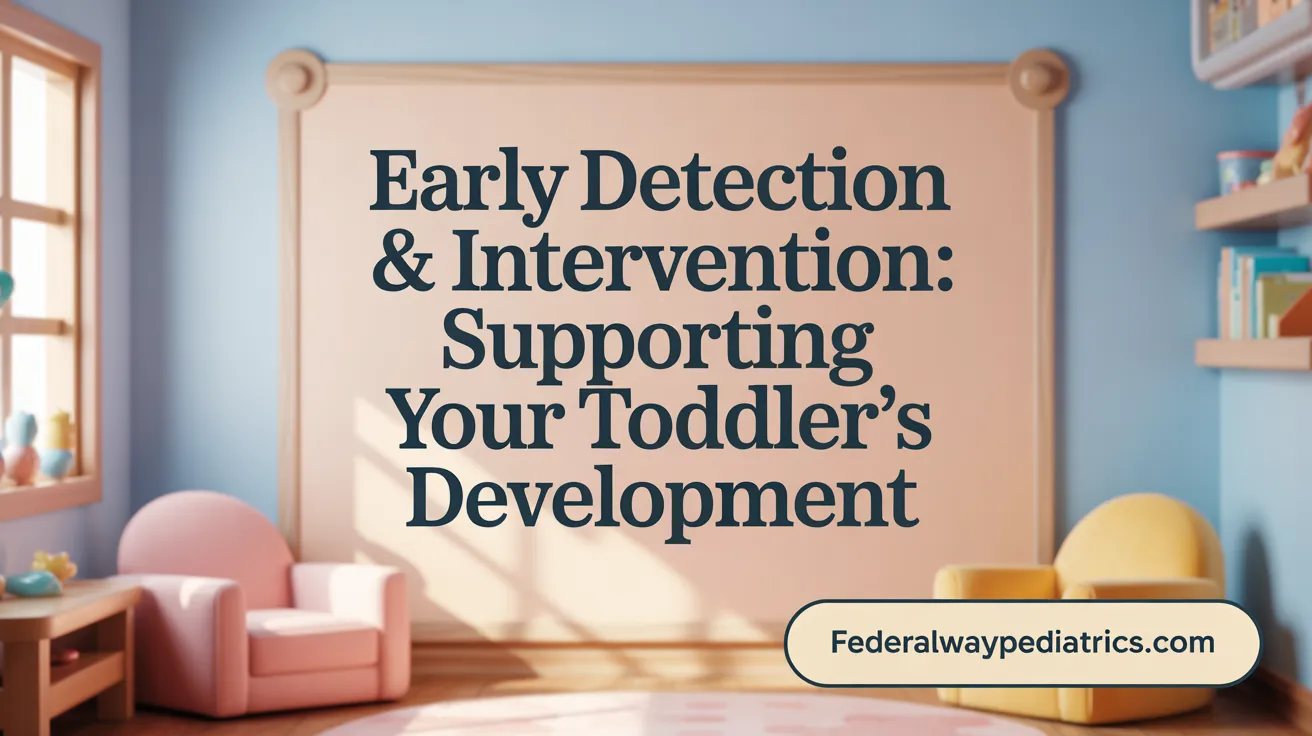Understanding the Importance of Developmental Milestones
Monitoring developmental milestones is crucial for ensuring toddlers grow and develop appropriately across various domains such as playing, learning, speaking, behavior, and movement. This process helps parents and caregivers recognize typical developmental progress, identify potential delays early, and connect children with support services promptly. Using trusted resources and understanding the stages of development empower families and professionals to guide children toward their fullest potential.
How Parents Can Track Their Child’s Developmental Milestones

How can parents track their child's developmental milestones?
Parents play a vital role in observing how their child grows and learns. By paying attention to behaviors such as playing, talking, moving, and interacting socially, they can spot whether their child is reaching typical developmental milestones.
Using reliable and easy-to-understand checklists from reputable sources like the Centers for Disease Control and Prevention (CDC) and the American Academy of Pediatrics (AAP) makes this process straightforward. The CDC offers milestone checklists for children from birth to age five, covering skills such as smiling, waving, crawling, and talking.
Parents are encouraged to look for these milestones during daily routines, play, and learning activities. For example, noticing if a toddler takes their first steps around their first birthday or if a preschooler can say simple sentences helps gauge progress.
In addition to regular observation, well-child visits with healthcare providers include developmental screenings, which are quick assessments conducted by professionals during routine checkups. These screenings help identify any delays early so that intervention can begin promptly.
If concerns about development arise, parents should contact their child's healthcare provider. For children under age three, early intervention programs are available mainly through state services. For older children, local schools or outpatient centers can provide assessments and support.
Creating a supportive environment is essential. This involves providing a safe space for play, engaging in age-appropriate activities, ensuring good nutrition, quality sleep, and regular healthcare. Positive interactions, such as talking, reading, and playing, encourage healthy development.
Overall, consistent monitoring, utilizing trusted resources, and collaborating with healthcare providers help ensure children stay on track and receive the help they might require to thrive.
Effective Methods for Monitoring Developmental Milestones

How should a child's developmental milestones be monitored effectively?
Monitoring a child's development accurately involves a combination of using developmental checklists, ongoing surveillance, standardized screenings, and professional evaluations.
Parents, caregivers, and early childhood providers should regularly use developmental checklists, like those provided by the CDC’s "Learn the Signs. Act Early." program. These tools help track a child's progress in key areas such as language, movement, social skills, and behavior. These checklists are easy to use at home and can be brought to medical appointments to encourage discussions with healthcare providers.
In addition to checklists, regular developmental surveillance during well-child visits helps to observe the child's growth over time. Healthcare professionals may ask questions, review developmental histories, and observe children performing age-appropriate activities.
Standardized screening tests are crucial at specific ages—commonly at 9, 18, and 30 months, with autism-specific screenings at 18 and 24 months. These brief assessments can detect subtle delays that routine surveillance might miss.
If screening tools or observations suggest a delay or concern, a comprehensive evaluation by specialists such as pediatricians, psychologists, or therapists is recommended. These specialists administer detailed assessments to determine if a child qualifies for early intervention services, which can significantly improve developmental outcomes.
Maintaining detailed records of milestones and screening results facilitates clear communication among parents, healthcare providers, and educators. This documentation supports early identification of potential delays, enabling timely action.
Overall, consistent use of checklists, regular surveillance, scheduled screenings, and collaborative follow-up are best practices to ensure children develop optimally and receive support when needed.
Typical Developmental Stages and Milestones in the First Two Years

Month-by-month milestones in infancy
During the first two years, babies reach numerous developmental milestones, each marking important growth in their physical, cognitive, social, and language abilities.
In the initial months, newborns begin to recognize familiar faces, respond to sound stimuli, and lift their heads during tummy time. By around 4 to 6 months, infants typically sit with support, reach for objects, roll over, and start to babble or make repetitive noises.
Between 9 and 12 months, most babies crawl, stand with support, and say simple words like "mama" or "dada." They develop fine motor skills such as pincer grasp, which allows them to pick up small objects. These early signs of coordination and communication are essential indicators of healthy development.
Specific skills by 1 year
By their first birthday, babies often demonstrate the ability to find the source of a sound, respond to their name, and wave goodbye. They may imitate actions and follow simple one-step commands.
Many children at this age begin to use words meaningfully, with some saying their first words, and they enjoy social interactions such as clapping or showing affection.
Development from 1 to 2 years
Between 12 and 24 months, toddlers achieve more advanced milestones. They usually expand their vocabulary to include 50–100 words, start combining words into simple sentences, and follow multi-step commands.
Toddlers also develop better motor skills: walking independently, climbing furniture, and beginning to run. Socially, they show increased independence, imitate adult behaviors, and develop new ways of communicating their needs and interests.
Domains of development
Development during these years spans multiple areas:
| Domain | Typical Milestones | How It Supports Growth |
|---|---|---|
| Social & Emotional | Smiling for the first time, waving, responding to others' emotions | Builds relationships and emotional understanding |
| Language | Cooing, babbling, first words, combining words | Foundations for effective communication |
| Motor Skills | Lifting head, sitting, crawling, walking | Physical independence and exploration |
| Cognitive | Recognizing objects, following simple instructions | Learning about their environment |
Variability in timing and cultural factors
It's important to recognize that children develop at their own pace. Some may reach milestones earlier or later, and variations can be influenced by cultural practices and individual circumstances.
Certain cultural backgrounds may emphasize different activities that promote specific skills, impacting the timing but not the overall development trajectory.
Monitoring and understanding these differences help caregivers support each child's unique growth pathway effectively.
Utilizing the CDC Milestone Tracker and Other Resources for Monitoring
 The CDC Milestone Tracker app is a popular, free digital tool designed to assist parents and caregivers in monitoring a child's development from age 2 months to 5 years. It offers illustrated checklists, complete with photos, videos, and expert tips, to help caregivers observe critical areas such as play, learning, speech, behavior, and movement. The app provides a user-friendly way to track milestones over time and offers tailored activities to support development.
The CDC Milestone Tracker app is a popular, free digital tool designed to assist parents and caregivers in monitoring a child's development from age 2 months to 5 years. It offers illustrated checklists, complete with photos, videos, and expert tips, to help caregivers observe critical areas such as play, learning, speech, behavior, and movement. The app provides a user-friendly way to track milestones over time and offers tailored activities to support development.
One significant feature of the app is its ability to generate milestone summaries, which can be shared with healthcare providers during well-child visits. This helps promote informed discussions about a child's progress and allows for early spotting of potential delays.
Beyond the CDC app, various resources exist to support developmental monitoring. Official milestone checklists, available as printable PDFs and online interactive tools, detail what most children should be able to do at specific ages. These checklists cover domains like motor skills, language, social-emotional development, and cognitive abilities, helping caregivers recognize typical progress.
Standardized screening tools such as the Denver II or Ages and Stages Questionnaires (ASQ) are also vital. Healthcare professionals often use these validated assessments to supplement milestone checklists, providing a more comprehensive evaluation of a child's development.
Educational programs like "Learn the Signs. Act Early." offered by CDC emphasize the importance of early detection, offering both checklists and guidance for parents. These resources encourage proactive observation and facilitate early intervention if concerns arise. Combining digital tools, checklists, and professional screening ensures a thorough approach to monitoring and supporting each child's unique growth trajectory.
Early Identification and Intervention: The Key to Supporting Toddlers' Development

Why is early detection of developmental delays so important?
Early identification allows children to receive timely support and services that can significantly improve their development and future outcomes. Many delays or disabilities are not easily noticed without close monitoring and screening, especially in the early months and years when children are rapidly growing. When delays are caught early, children can benefit from intervention services that help them catch up with their peers, reducing long-term challenges.
How do healthcare professionals and caregivers evaluate developmental milestones?
Assessing milestones involves both ongoing monitoring and specific screening tests. Parents, grandparents, early childhood providers, and caregivers can participate by observing and checking off development signs using simple checklists, such as those provided by the CDC. During well-child visits, healthcare providers review developmental progress by asking questions and observing behaviors that reflect whether children are meeting age-appropriate milestones in play, learning, speech, and movement.
When and how are formal developmental screenings conducted?
Developmental screening includes brief, validated questionnaires or tests administered by health professionals at specific ages—typically at 9, 18, and 30 months. For autism spectrum disorder, screening is recommended at 18 and 24 months. These tools, like the Ages and Stages Questionnaire or the M-CHAT, provide a more in-depth look at a child's language, motor skills, social skills, and behavior. If concerns are raised during screening, a detailed assessment by specialists such as pediatricians, psychologists, or therapists may be necessary.
What intervention options are available from birth to school age?
Early intervention services are crucial for supporting children from birth to age 3, helping them develop vital skills in communication, motor, and social areas. For children aged 3 and older, special education services are available through their local school systems. Programs like Child Find conduct evaluations to determine suitability for services. Referrals to early intervention or special education can be made by parents or healthcare providers, ensuring each child's needs are addressed early.
How does early intervention influence long-term outcomes?
Research shows that children who receive early interventions tend to improve more quickly and develop skills closer to age expectations. Early action can help prevent or lessen the severity of developmental delays, supporting better social, behavioral, and academic skills later in life. The brain develops most rapidly in the first three years, making this a critical window for intervention.
The role of parents and providers in ongoing monitoring and follow-up
Regular observation and communication between families and professionals are vital. Parents should use checklists and digital tools, like CDC’s Milestone Tracker, to monitor development between visits. If a concern arises, discussing it with a healthcare provider enables further screening or assessment. Collaborating with specialists ensures that any delays or issues are addressed promptly, promoting the best possible outcomes.
Examples of when to seek professional assessment
Parents or caregivers should consider a professional evaluation if they notice a child is not reaching milestones such as smiling socially by 2 months, sitting without help around 6 months, or walking by 15 months. Regression of skills, persistent speech delays, or unusual behaviors also warrant timely assessment. Early sign that a child may have a hearing loss, autism spectrum disorder, or motor skill trouble should prompt consultation with a healthcare professional.
| Milestone Area | Typical Age | Signs of Concern | Suggested Action | Additional Notes |
|---|---|---|---|---|
| Sitting without help | 6 months | Doesn't sit steadily | Seek evaluation | Early intervention supports motor skills |
| First words | 12 months | No babbling or words | Consult a pediatrician | Speech therapy may be needed |
| Walking | 15 months | Not walking | Professional assessment | Could indicate motor delay |
| Social smiles | 2 months | No social smiling | Contact healthcare provider | Early social engagement is vital |
| Use of two words | 24 months | Lack of speech | Screening and possible therapy | Supports language development |
Resources for parents and providers
The CDC offers free tools like 'Learn the Signs. Act Early.' materials and milestone checklists to support early detection. State and local programs, such as NYC’s Early Intervention Program, help families evaluate children and connect them to necessary services. With early screening, ongoing monitoring, and professional assessments, children have the best chance to develop to their full potential.
Ensuring Healthy Development Through Vigilant Monitoring and Support
Monitoring developmental milestones in toddlers is an ongoing, collaborative effort that involves parents, caregivers, healthcare providers, and educators. Utilizing resources like milestone checklists and screening tools enables early detection of potential delays, which is critical for timely intervention. Early support services can significantly improve developmental outcomes and help children reach their full potential. By staying informed, attentive, and proactive, families can provide the nurturing environment every child needs during these formative years, ensuring a strong foundation for lifelong health and learning.
References
- Developmental Monitoring and Screening - CDC
- CDC's Developmental Milestones
- Monitoring Children's Development - ChildCare.gov
- Babies and Toddlers: Developmental Milestones
- Developmental Milestones Tracking and Monitoring Resources ...
- Infant & Toddler Developmental Checklists - CLI Engage
- Evidence-based milestone ages as a framework for developmental ...
